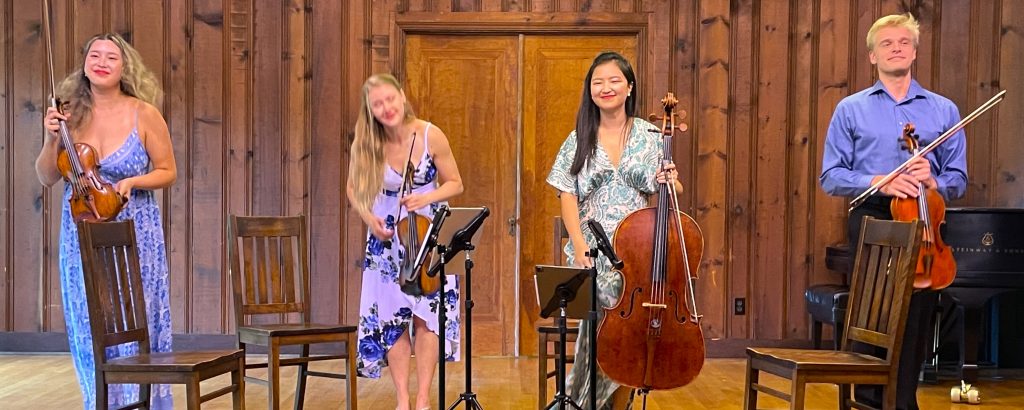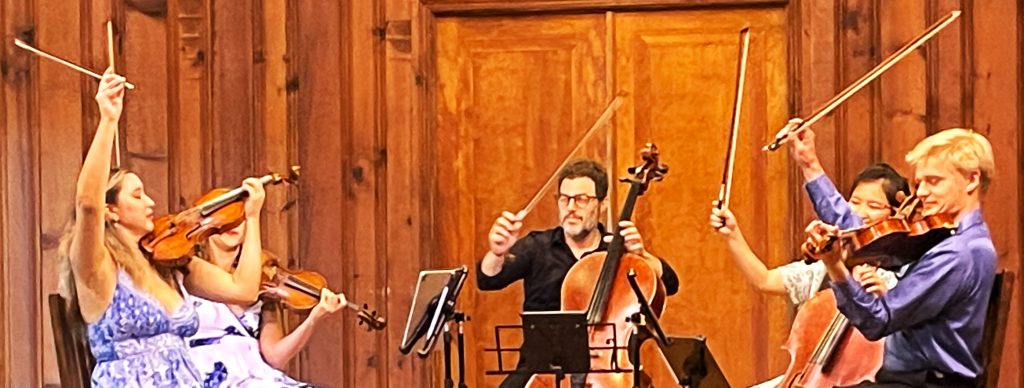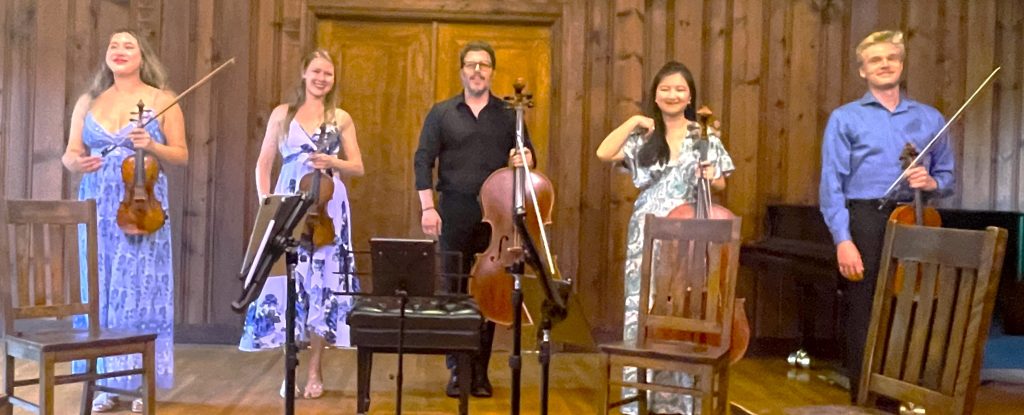
by Kevin T McEneaney
Under the brilliant sunny skies of Music Mountain, The Ulysses Quartet opened with Plan & Elevation by Caroline Shaw, who became the youngest recipient of the Pulitzer Prize for Music when she was thirty. She was awarded the prize for her unusually original Partita for Eight Voices. In addition to being a composer, she is a violinist with the American Contemporary Music Ensemble (ACME) and a vocalist with Roomful of Teeth. She has accumulated several Grammy awards and has done television and film music, including Beyonce’s Homecoming.
Plan & Elevation, as the title indicates, is about architecture and the elevated mood gardens may bestow on the acute observer. She composed this string quartet for the 75th anniversary of Dumbarton Oaks. This composition presented an ethereal, high-pitched sonic perspective on the architecture of the building, and then the labyrinth of gardens surrounding the house.
The unusual aerial bird’s eye perspective of the music delivers both an arresting and flowing water motif that generates an emotionally healing ambiance. One experiences “seeing “the large building from the point of view of a bird flying about the building, then flitting about over the meandering gardens. Pizzicato is employed to dramatize splashing fountains or a light shower of rain. The work induces a palpable psychological experience of healing and wholeness. Christina Bouey on first violin ascended into such pleasantly high registers that I felt hypnotized into delight!

String Quartet # 1, “Kreutzer Sonata” (1923) by Leoš Janáček (1854-1928) followed. This was a feminist point-of-view response to the notorious late novella by Leo Tolstoy wherein a husband murders his wife when he discovers that she had an affair with a man after listening to a concert where Beethoven’s Kreutzer Sonata was played; the novella denounces all music as an immoral, sensual pleasure that should be prohibited. (The murderer is acquitted by a jury due to the wife’s adultery when the husband was away on a long business trip.)
The first movement presents the wife arguing with her husband; here Grace Ho on cello captured the menacing tone of the self-afflicted husband while Rhiannon Banerdt on second violin offered nuance in the ferocious to-and-fro. The second movement provided a flashback to the erotic scene of infidelity; here Peter Dudek on the viola delivered colored resonance describing the sexual act.
The third movement described the gruesome knife murder where Christina Bouey’s first violin soared poignantly with the screams of the dying wife. The plangent lament for the death of the wife constituted the fourth movement; here the strings were tightly united to describe the senseless and vicious derivation of a woman’s life due to misogynistic rage. An intense and memorable pathos was achieved!
The audience demanded two bows.

Guest cellist Nicholas Tzavaras, recently retired from being the cellist of the internationally renowned Shanghai Quartet, joined to play Cello Quintet in C Major, Opus 163, D. 956 (1828) by Franz Schubert. Written two months before Schubert died, the work features two cellos. Critics acclaim this work as Schubert’s finest chamber work. Despite operating in the more optimistic major, the composition manages to evoke pathos in the Romantic tradition of the sublime.
Luigi Boccherini invented the cello quintet with the second cello playing in the higher register, sounding halfway between a viola and cello, yet here in Schubert, the two celli play together in the lower register, delivering an exuberant, resilient optimism, while the sound of the single viola, elegantly played by Peter Dudek, is highlighted. Once more the violin of Christina Bouey sang with passionate authority.

Lead cellist Nicholas Tzavaras, the heartbeat of this quintet, was exceptional in his thrilling, low-register delivery, as the quartet soared in galvanized unity. There is much repetition of motifs with subtle, joyous, variations in this monumental composition. The nearly hour-long score is an exclamation mark by a genius who died at thirty-one after composing nearly one thousand musical works.
This program offered intense, emotional gear-shifting that explored an intense range of emotions. The audience demanded three bows.

Next Sunday, September 1, 2024 – 3:00 PM
Ying Quartet & Elinor Freer, piano
Franz Joseph HAYDN String Quartet in B Flat Major, Opus 50, #1, “Prussian”
Carter PANN Love Letters
Robert SCHUMANN Piano Quintet in E Flat Major, Opus 44